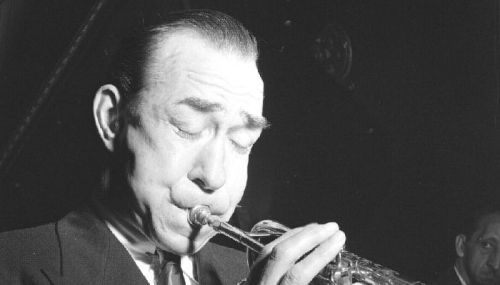I just acquired the late Bert Whyatt’s bio-discography of Muggsy Spanier, THE LONESOME ROAD. Published by Jazzology Press in 1995, it feels fresh.
I read non-fiction books haphazardly, especially when I know the shape of the narrative, but for some reason I began this one at the beginning, where Bert wrote of his connection with Ruth, Muggsy’s widow, and her wholehearted cooperation in the book, which combines his research with her unpublished memoir.
I found this passage on page 7 and think it moving beyond simple explanation. (Note: in his last years, the Spaniers lived in Sausalito, California, a town the Beloved and I came to know):
One evening, we [Bert and his wife and Ruth] returned to Sausalito from San Francisco and Ruth asked us to pull the car off the road which runs down from the north side of the Golden Gate Bridge.
“We often would stop here for a last cigarette after the Club Hangover had closed for the night,” she said. “It helped Muggsy to unwind and we would usually sit quietly, saying little. Sometimes he would seek reassurance that I loved him. ‘I feel so lonely and afraid,’ he would say. I would remind him of the affection felt for him worldwide, of all his friends who loved him and, of course, that I did too.”
She paused and then said, “If we ever get that book finished, we should call it ‘Muggsy Spanier: The Lonesome Road.'”
My first reaction to this little tale was astonishment, then sorrow. To think that a man so much at one with his art, after an evening of sharing joy through his music, could feel so desolate and frightened, was nearly shattering.
I then thought wryly that I had been wrong in assuming that playing hot cornet was armor against existential dread. . . . that a plunger mute could keep such essential anxiety at a distance.
But even as I felt sorrow and sympathy for Muggsy, I was flooded with pride and admiration. He was born in 1901, and it might be cliched to write that men of that generation were told it was unmanly to reveal their hearts with such openness, perhaps even to their wives. Being male required staunchness and emotional reserve. Oh, one could say “I love you!” to one’s Beloved, one could woo the person one wanted to be intimate with by using words like those, one could say it to children. But to say I NEED LOVE and I AM AFRAID was not something men were trained or encouraged to do. Candor like that might have seemed a confession of weakness.
But somehow Muggsy knew that his emotions were the magical element that made him able to play the blues, or the love song that he aimed directly at Ruth in their courtship, I’M CONFESSIN’. Love was at the center of his art. And such heartfelt candid utterance. And he found the courage to push aside his expected role and, in the darkness, speak his truths.
I celebrate Ruth also for creating an atmosphere where her husband could confess his inmost heart and receive reassurance and love, not dismissal or mockery. She must have understood her husband’s need as genuine and commendable. She didn’t say to him, “What is wrong with you, talking like that?”
Perhaps she knew that it takes a brave individual to openly say, “I am afraid,” an honest one to say, “I am lonely.”
Because of this anecdote, the man I admired as a jazz musician is now enhanced rather than diminished, a figure larger and more beautiful than an anxious man seeking reassurance. Muggsy Spanier, perhaps an unlikely figure, is the embodiment of our deep need for love — a hero of that exalted emotion. He seems to have known that without it, we wither.
His own road might have been lonesome, but I find his openness inspiring and brave.
May your happiness increase!

